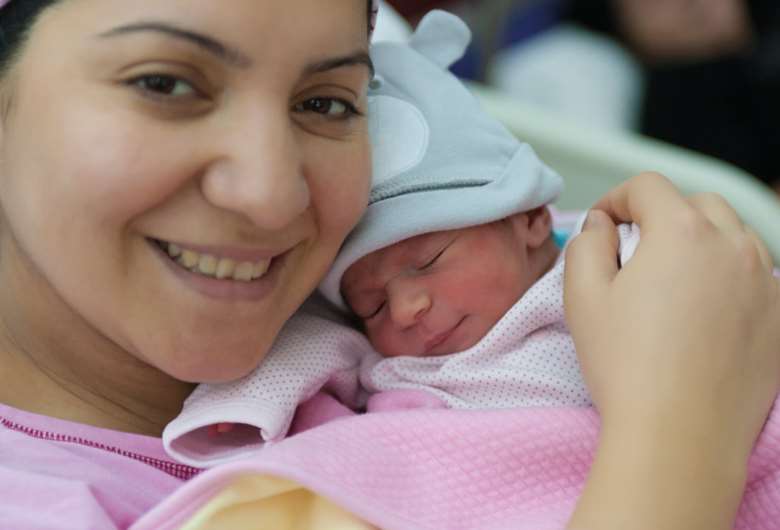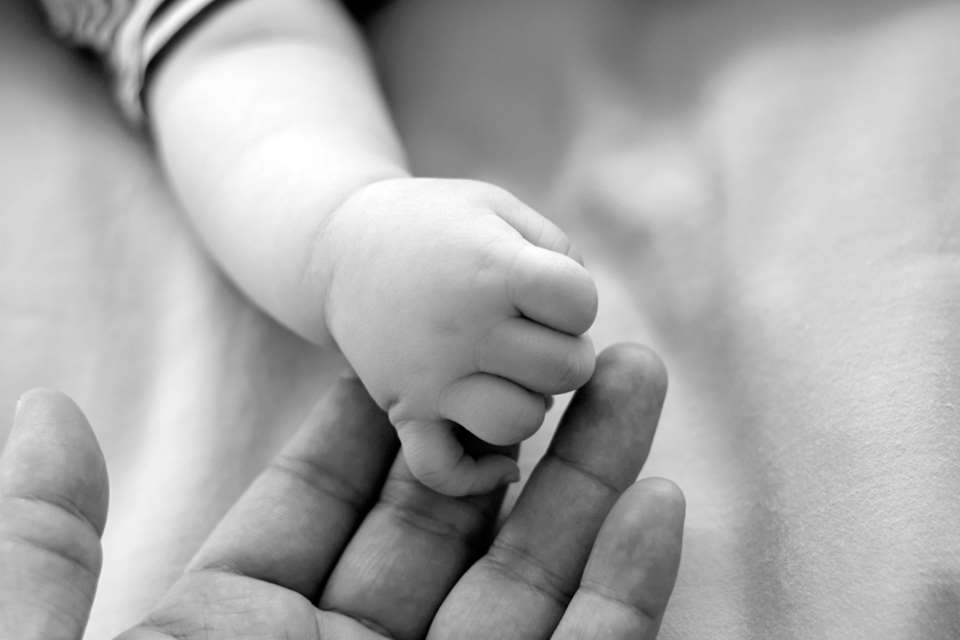A Unique Child: Infant Mental Health - Never alone
Ruth Thomson
Monday, May 30, 2016
Early family relationships play a key role in infant health and well-being, explains Robin Balbernie

The well-being of a very young child cannot be separated from the relationship that they have with their parents. Interpersonal well-being is the essence of infant mental health, an outlook and body of research that both revolve around the importance of maintaining good social and emotional development from the start. As Donald Winnicott famously observed, ‘There is no such thing as a baby.’ In other words, we always find a small child embedded within their family, never a baby alone.
In most, but not all, cases the prime caregiving relationship applies more to the mother than the father, certainly in terms of time. But fathers also have a central role to play in the development of their children, again based upon relationships. Infant well-being springs from the matrix of early family relationships, whatever their configuration.
A child’s earliest relationships will influence how they react to inevitable challenges as they go through life. A caregiver’s task is to return the baby to a state of rest whenever they are struggling with unmanageable emotions, unmanageable because they have yet to develop the necessary neurological circuitry to do this alone. In this way, the parent plays the role of auxiliary pre-frontal cortex.
A baby and toddler who has parents who can respond appropriately to his or her needs and feelings and promote a sense of safety and of being unconditionally loved is likely to grow up with secure attachment; this is the best start in life for anyone. Such a child, regardless of all other individual characteristics, is likely to be resilient in the face of subsequent difficulties and challenges. They will also be more curious and creative, and so be in a good position to make the best use of life’s opportunities, including education and lifestyle choices. On the other hand, those children with insecure attachments will find the same difficulties and challenges that bit harder to overcome.
THE SOFTWARE OF RELATIONSHIPS
The ‘software’ of relationships is initially programmed within the mind during the pre-verbal period and is thus taken for granted unless subsequent events set up a situation when this has to be questioned. Attachment theory calls these implicit assumptions ‘internal working models’, and they govern how the individual will react to and form subsequent relationships, their capacity for emotional regulation (self-control) and are fundamental to a sense of personal identity and self-esteem. Babies and toddlers have no choice but to adapt to their family habitat; this is demonstrated by different responses to anxiety and stress that show as the stereotyped patterns of attachment (which are rarely found in a pure form).
When these relationships are positive, when parents and small child together can have fun and the parents are sensitive and appropriately responsive (which does not mean either getting it right every time or giving in to the child’s demands), then that is pretty much the best formula for any child’s well-being.
On the other hand, when the infant finds consistent stress rather than comfort within the family, then survival takes precedence over emotional connection. Children from a background of traumatic family relationships are more likely to struggle in all these domains of development, often finding that both themselves and those around them feel frustrated and unhappy for reasons they cannot put into words.
1,001 CRITICAL DAYS
Later on, the importance of the first significant relationships will generalise out to substitute caregivers away from the immediate family, such as relatives and childminders. This environment of very important relationships that marks the stage of maximum dependency is both outside of the child and, in terms of both their psychology and neurology, also an aspect of what is going on inside.
Early relationships influence the developing mind, especially during the first 1,001 critical days from conception to age two when the brain is in the process of initial formation and so most open to change, a process based on the amazing neuroplasticity found in humans.
At birth a large amount of the baby’s brain has yet to be wired up. The ‘life-support systems’ of the autonomic nervous system are operating, but for the rest of the brain, the connections have barely started to form.
A large number of situations in utero, such as maternal stress, alcohol and drug use, can have negative and long-lasting effects on brain functioning. The greater majority of the neurones that an individual will have for their lifetime are present at term. However, the fibres carrying outgoing energy, called axons, and those that gather in signals from others, dendrites, are mostly not in place.
These inter-cell circuits, which go on to form incredibly complex neuronal networks, are often called synapses – although strictly speaking the synapse is the tiny gap between the axon of one neurone and the dendrite of another that is bridged by neurotransmitters. These synaptic connections take up a lot of volume, and so by ensuring that the bulk of their formation occurs after the baby is born, the process of giving birth is safer for all concerned.
This also means that the structure of the brain in certain key areas will be influenced by the quality of relationships and general stimulation within the family, for better or for worse. The human brain is at its most adaptable, or ‘plastic’, during this initial period of formation. This is not to say that change is impossible at any later period of life. However, any system is easier to adjust during the set-up period rather than after it has been established.
WINDOWS OF OPPORTUNITY
The early developing brain needs appropriate input in order to create efficient neuronal connections during the windows of opportunity afforded by the normal waves of synaptic growth; these are often called ‘sensitive periods’. Each area of the brain in turn goes through a process of synaptic proliferation and then pruning. These sequential phases of development ensure that the correct circuits are in place to match the specific demands of the individual environment. This is known as ‘experience expectant’ brain growth.
The brain will preserve the circuits it appears to need to adapt to a particular environment. There is a neurological assumption that this is it for life, stabilising them through a process known as myelination and discarding the rest in the interests of efficiency and available space.
Brains also form circuits in an ‘experience dependent’ manner, learning from experience, a process that never ends. Attachment quality is an example of both processes in combination. A straightforward way of thinking about this is to remember the two phrases ‘neurones that fire together wire together’ and ‘use it or lose it’, with subsequent learning (as we all know from school) a matter of ‘inspire and re-wire’.
If the emotional environment is one that causes the child to consistently feel unsafe and fearful, at the worst extreme experiencing ‘toxic stress’, then this will be reflected in the final survival, threat-reactive circuits of the brain and the hormonal imbalance behind a hair-trigger stress response. Without help, such a child may go through life reacting to even minor problems as if they were a dangerous life-threatening situation. Thus disruption and stress in the early attachment relationship is the best predictor we have for a life that is likely to be full of struggles. And, of course, prime among these is becoming a parent in turn. Without intervention, the cycle of poor attachment and a lack of personal well-being continues.
KEY POINTS
Babies and toddlers with parents who can respond appropriately to their needs and promote a sense of safety and unconditional love are likely to grow up with secure attachment. Such children are more likely to be confident, resilient, curious and creative, and so well-placed to make the best of life’s opportunities, including education.
Children with difficult early relationships, especially where there has been any form of maltreatment, will find the same challenges harder to overcome. These children have adapted on both a psychological and neurological level to an overwhelmingly stressful environment that was beyond their comprehension. Without specialised help, which becomes less cost-effective as the child grows older, they continue to be locked into survival mode, flicking into a defensive stress response so rapidly that they may not be aware of the reasons themselves. This lies behind a swathe of antisocial and violent behaviour, and forms the start of a pathway that can lead to many long-term physical and mental health problems.
Toddlers with seriously compromised attachment are at the beginning of a developmental pathway leading to adult difficulties that will make it hard for them to join the workforce and contribute to society. Such individuals are disproportionately highly represented in Child and Mental Health Services (CAMHS), social services’ child protection interventions, the criminal justice system, the health service (cancer, obesity, smoking-related illnesses, suicide attempts, etc) and substance abuse services, and often need treatment for serious mental health disorders in adulthood. They come to represent a very large hole in the public purse and tend not to contribute to society.
Disruption and stress in the early parent-child relationshipare the best predictor we have for a life that will be full of struggles and unhappiness. Prime among these is becoming a parent in turn. Without intervention, the cycle of poor attachment continues. Babies cannot wait.
MORE INFORMATION
Infant Mental Health Week, 6-10 June 2016, www.pipuk.org.uk/our-story/infant-mental-health-week
Robin Balbernie is a clinical director of Parent Infant Partnership UK (www.pipuk.org.uk) and is involved in Infant Mental Health Awareness Week, 6-10 June.









